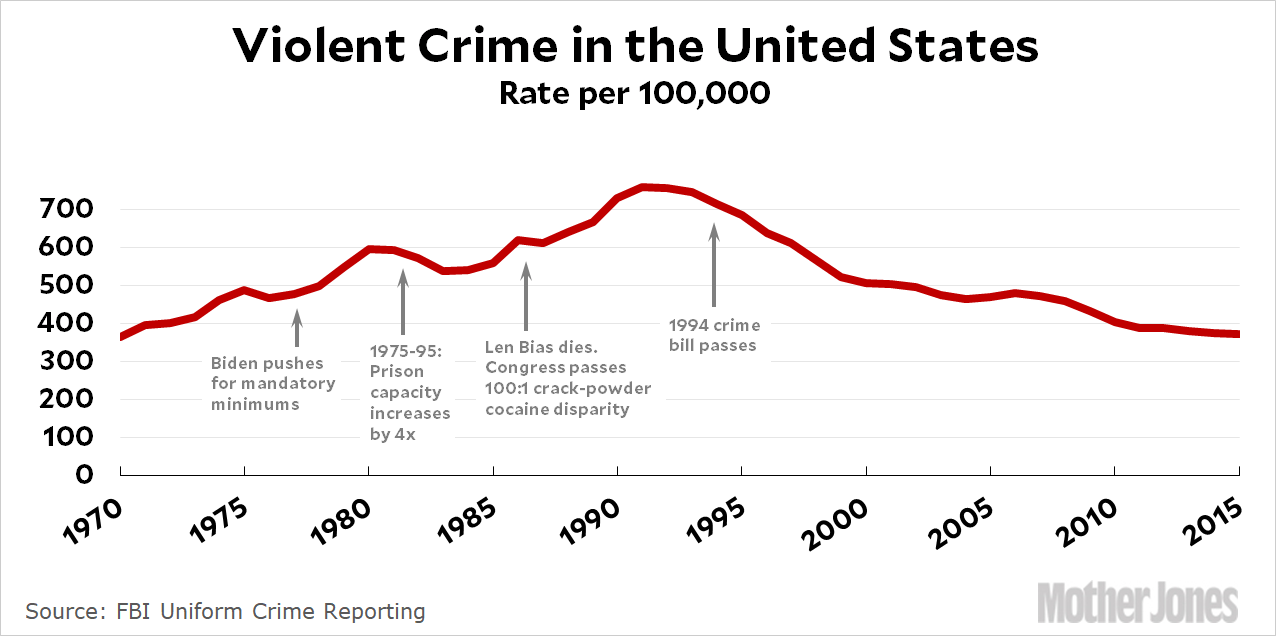The New York Times today has a long piece about Joe Biden and his support for crime legislation back in the ’80s and ’90s. It starts out like this:
Mr. Biden arrived in the Senate in 1973 having forged close ties with black constituents but also with law enforcement, and bearing the grievances of the largely white electorate in Delaware.
Wait. How could that be? Biden had close ties with law enforcement but African American leaders liked him too? If you listen only to the activists of today, who grew up in an era of low and declining crime, it hardly seems possible that both of these things could be true at once. But 50 years ago they could be. Here is Josh Marshall:
Much of this current discussion is carried on as though the crime wave of the late 20th century simply didn’t happen. This is a mistake for a lot of reasons. But the biggest is that you simply can’t understand anything about the politics of the last half century without understanding the magnitude of its impact. The crime wave of the late 20th century is probably one of the two or three most consequential events that shape the world we live in in the United States.
This isn’t to justify what we now call mass incarceration. There are many who still argue that we had a crime wave, we dramatically increased the number of people in prison and since the criminals were no longer on the streets the crime rate fell dramatically. Maybe we overshot in how many people we locked up, these people argue. Maybe we can reduce the numbers of people in prison now. But locking people up was a big cause for the fall in crime.
I sometimes feel like the current discussion surrounding crime and incarceration is a lot like wondering why the United States invaded Europe in 1944. Unless you know that Hitler had conquered most of the continent, it doesn’t make any sense. Once you do know that, it makes no sense to suggest that FDR did anything wrong.
It’s the same with crime. All of the tough-on-crime sentiment of the ’70s through the ’90s makes no sense unless you know that violent crime had more than doubled since the mid-’60s:

This enormous crime wave devastated black communities, and it prompted lots of black leaders to support tough-on-crime measures. Not all of them. But lots of them. Prisons were built and mandatory minimums were passed, largely with the support of black leaders. The crack cocaine sentencing law passed as an amendment to a bill in 1986 and was barely even debated. This happened in the midst of a crack epidemic that was absolutely devastating to black neighborhoods, and most black leaders were desperate to do something about it. The only real question was whether crack sentences should be 10x, 50x, or 100x longer than powder cocaine sentences. Seven years later, with crime at its peak, Jesse Jackson famously said, “There is nothing more painful to me at this stage in my life than to walk down the street and hear footsteps… then turn around and see somebody white and feel relieved.”
All of this stuff is up for reasonable debate. The crack cocaine law was passed during a public panic over the death of basketball star Len Bias—who, it turned out, died from overdosing powder cocaine, not crack. Building prisons did take violent criminals off the streets, but prisons were probably overbuilt by a factor of two. The 1994 crime bill was supported by most black members of Congress, and in any case was a compromise bill with some of its most punitive measures added by Republicans. And Republicans ruthlessly used the spectre of crime—along with racial imagery like Willie Horton—to appeal to their white base.
That said, nothing about this era makes sense unless you understand that crime really was rising and it really was scary. The absolute number of violent crimes tripled from 1970 to 1990 and people—black and white alike—were afraid to walk the streets at night. They demanded action, and they got it. There were tons of mistakes along the way, but the fundamental motivation for the tough-on-crime movement was the fact that there was a lot of crime.
The truly horrific part of all this has nothing to do with any particular piece of legislation. The horrific part is that it was mostly pointless. As we know now, the huge crime wave was caused mostly by lead poisoning of children from car exhausts.¹ When the lead went away, so did the crime. And since lead poisoning was worse in central cities, where cars were more concentrated, it affected black kids more than white kids: at its peak, lead poisoning was 6x worse for black kids than for white kids. Their crime rates really did go up more than white crime rates, and with the lead gone their crime rates have declined faster than white crime rates.
So that’s what happened. Crime skyrocketed. People were quite naturally scared to death. Politicians responded. Plenty of mistakes were made along the way, and racial animus surely played a role in that, but the motivation was basically simple: to reduce crime and get violent criminals off the streets. It is historically ignorant to pretend that this all happened for no particular reason at all—or for purely racist reasons.
The real question now is: what are we going to do? We know what caused the crime spike, and we’ve fixed that. Crime is now down to 1970 levels. So when are we going to get our laws back to 1970 levels too?
¹My original lead-crime piece from 2013 is here. Further information is here. A 2018 update is here.

















